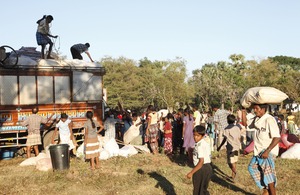Almost home: restarting life after conflict in Sri Lanka's 'rice bowl'
Helping displace people return home after conflict is one of the first steps towards building peace and stability

People unload what little belongings they have from trucks at a transit centre in the village of Oddusuddan, northern Sri Lanka. Russell Watkins/DFID
Almost home: restarting life after conflict in Sri Lanka’s ‘rice bowl’
Video: report from Oddusuddan, northern Sri Lanka
Glad to be home
Thirty-four-year-old Ramachendrum is certainly glad to be back home - even if ‘home’ for the moment is a simple one-room shelter.
He’s one of thousands of civilians who’ve been helped to get home by the International Organisation for Migration (IOM) in northern Sri Lanka. He was displaced for over three years by the conflict in Sri Lanka, and spent more than nine months living in a camp.
DFID has provided IOM with more than £1 million to help provide safe and dignified transport for over 40,000 returning displaced people (IDPs) like Ramachendrum who have been released from the camps over recent months.
With IOM’s programme, each household is registered in the camps and then boards buses to take them to transit centres in their home areas. Medical staff and ambulances are provided for the most vulnerable, and a fleet of trucks accompanies the buses with each household’s remaining belongings.
Local school buildings are frequently used as transit centres. Families will typically stay in these centres for a few days while they receive land mine awareness training and make one or two ‘day trips’ to their former homes, to assess damage to property and make basic preparations to finally return home.
Starting again
Ramachendrum arrived back in his village in January to find that, like many other people in the area, his home had been destroyed in the conflict.
“My brother was killed and his wife and my son were both injured in the fighting. We used to have a two room house, but it was destroyed. We lost everything - even our coconut trees - so now we are starting again.”
He used to be a technician in a government veterinary centre but the building was also damaged in the conflict. Now he is having to learn how to grow rice until he can go back to his old job.
He has been supported by several UK aid funded projects. As well as providing transport for the 40 mile journey from the camp to his village, IOM have helped clear a well and construct a toilet, so that the family has clean water and sanitation facilities.
UNOPS have helped him to build a transitional shelter for his family and the UN’s Food and Argiculture Organisation have provided him with seeds, basic tools and farming training so that he can grow enough rice to feed his family and to sell in order to generate income.
Ramachendrum’s story is typical of many thousands of families in northern Sri Lanka. Find out more about how we’ve helped him and others in our photo-essay.